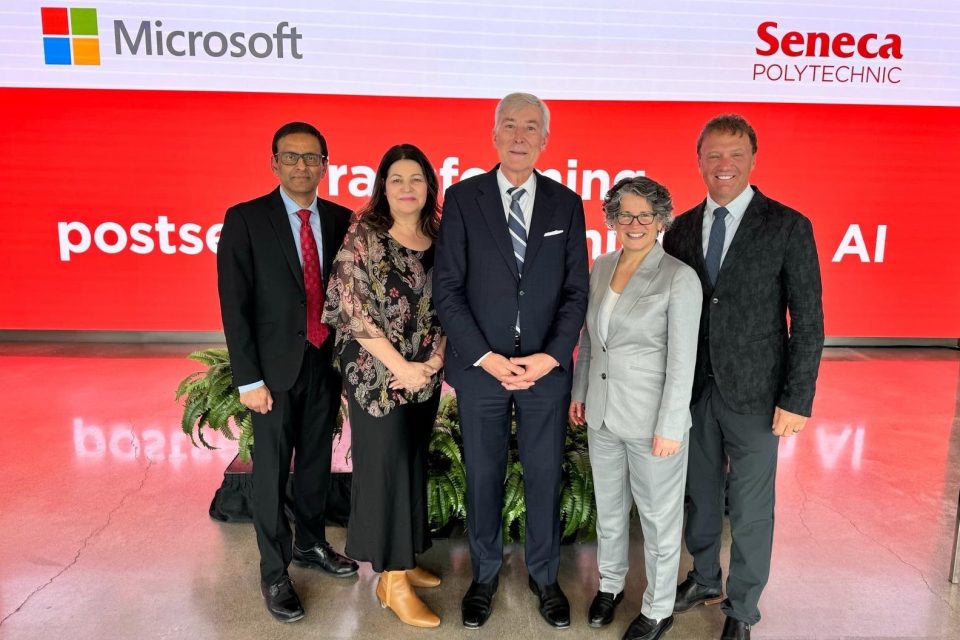Seneca Polytechnic among the first Canadian postsecondary institutions to bring Microsoft Azure AI technologies to students to support learning and career goals.
TORONTO, Feb. 22, 2024 – Seneca Polytechnic announced it is bringing the power of Microsoft Azure AI technology to students and employees through several new initiatives designed to prepare students for the workforce of the future.
Seneca will integrate Azure OpenAI to develop an AI tutor that supports enhanced learning of course material and simulated, personalized job interviews based on job postings. Seneca students will be among the first in Canada to experience this type of innovation.
“I am delighted that Seneca is partnering with Microsoft to bring responsible and innovative AI technology to the forefront of the teaching and learning experience for our students and employees, forming the cornerstone of our commitment to leadership in digital innovation,” said David Agnew, President of Seneca Polytechnic. “Seneca shares a student-first approach, and that’s the foundation of our collaboration with Microsoft to harness the power of AI to enrich our polytechnic education for students.”
As part of the collaboration, Seneca is developing an AI tutor that will help amplify student learning. The tutor will serve as a personal companion for students, working with them to enhance their knowledge and understanding of course material. It will be built integrating Microsoft Azure OpenAI, ensuring student privacy and security so they can focus on learning. Students will be able to use the tutor outside of the classroom to answer questions related to course materials, helping to level the playing field for students of all learning abilities. The AI tutor will also generate personalized quizzes and provide feedback on homework.
“AI innovation is transforming today’s classrooms, unlocking new possibilities for student success, creativity and learning,” said Marc Seaman, Vice President, Education Sector, Microsoft Canada. “Seneca’s AI tutor integrates Microsoft Azure OpenAI to enable deeper understanding of course material inside the classroom and at home, for a learning experience that is personalized, inclusive and relevant in today’s digital economy. Students will gain skills, guided by personalized AI experiences, ensuring they graduate not just job-ready, but future-ready.”
The collaboration demonstrates Seneca’s commitment to convenient and broadly available education opportunities for all students. These new advancements will help ensure that students and employees have the support they need whenever, wherever and however they need it – a key factor in student support, which directly contributes to overall student success.
Microsoft Azure AI services will also be used to enhance InStage, a platform created at Seneca’s innovation and entrepreneurship incubator HELIX. Currently, InStage helps students develop communication and other human skills in preparation for job interviews. Students will soon be able to generate personalized job interview simulations based on specific job postings and gain comprehensive feedback on their performance in the simulated environment.
Today’s announcement is the latest in a series of developments that put Seneca at the forefront of AI in Canadian postsecondary education.
Seneca also recently seconded professors Panos Panagiotakopoulos and Kent Peel to the role of AI Thought Leaders. A first-of-its-kind role in postsecondary, the professors will share their insights and learnings on the latest AI-related issues, including how it can enhance the learning experience and what will be needed to prepare students for the world of work where AI is the norm.
Up next is Seneca’s focus on using Microsoft Azure AI technology to enhance The Service Hub – Seneca’s omnichannel destination for student support – as well as other institutional-wide resources for students and employees.





